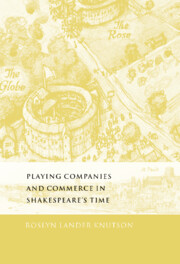Book contents
- Frontmatter
- Contents
- List of maps and tables
- Acknowledgements
- 1 Theatre history as personality
- 2 Players and company commerce
- 3 Playwrights, repertories, the book trade, and company commerce
- 4 Histrio-Mastix and company commerce
- 5 Hamlet and company commerce
- 6 Poetaster, Satiromastix, and company commerce
- 7 Conclusion: Hot Anger and company commerce
- Notes
- Bibliography
- Index
2 - Players and company commerce
Published online by Cambridge University Press: 22 September 2009
- Frontmatter
- Contents
- List of maps and tables
- Acknowledgements
- 1 Theatre history as personality
- 2 Players and company commerce
- 3 Playwrights, repertories, the book trade, and company commerce
- 4 Histrio-Mastix and company commerce
- 5 Hamlet and company commerce
- 6 Poetaster, Satiromastix, and company commerce
- 7 Conclusion: Hot Anger and company commerce
- Notes
- Bibliography
- Index
Summary
True men can differ vigorously and be friends.
Henry MorleyAccording to Charles W. Wallace in The First London Theatre (1913), John Alleyn and the Admiral's Men left the Theatre for the Rose in November 1590 because of a quarrel over money owed to Alleyn and his company by James Burbage. Wallace's evidence was Alleyn's depositions in the lawsuit, in which Alleyn testified to an angry exchange between himself and Burbage about the playhouse receipts. Wallace implied that this quarrel became a commercial rivalry between the Admiral's Men and the Chamberlain's Men. The alleged Alleyn-Burbage feud was soon regarded as fact. W. W. Greg in Dramatic Documents from the Elizabethan Playhouses (1931) explained the provenance of playhouse documents by way of it, and R. B. Sharpe in The Real War of the Theaters (1935) based a theory of commerce on it. Current narratives of company histories continue to show residual effects of the belief that a players' feud became company rivalry. In The Shakespearian Playing Companies (1996) Andrew Gurr, who elsewhere argues for the cooperation of the Lord Admiral and the Lord Chamberlain in the establishment of their respective companies in 1594, depicts the Admiral's Men as losing “no time in moving” to the Fortune when the Chamberlain's Men moved into the Globe, across the street from the Rose; he adds that Philip Henslowe brought the company of Worcester's Men into the Rose “as a reprisal of sorts, putting it in direct competition with its new rivals and neighbours at the Globe.”
- Type
- Chapter
- Information
- Playing Companies and Commerce in Shakespeare's Time , pp. 21 - 47Publisher: Cambridge University PressPrint publication year: 2001



